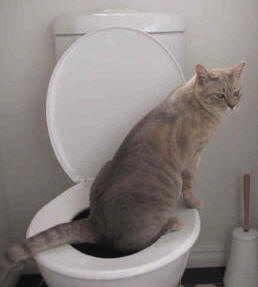Reasons You Should Avoid Flush Cat Poop Down Your Toilet - Important Facts
Reasons You Should Avoid Flush Cat Poop Down Your Toilet - Important Facts
Blog Article
Almost everyone may have their own concepts when it comes to Can You Flush Cat Poo or Litter Down the Toilet?.

Introduction
As pet cat owners, it's vital to be mindful of just how we throw away our feline close friends' waste. While it might seem practical to purge feline poop down the commode, this technique can have damaging effects for both the setting and human health and wellness.
Alternatives to Flushing
Fortunately, there are much safer and extra responsible methods to throw away pet cat poop. Take into consideration the following choices:
1. Scoop and Dispose in Trash
One of the most typical method of taking care of pet cat poop is to scoop it right into a naturally degradable bag and throw it in the garbage. Make certain to use a dedicated clutter scoop and take care of the waste immediately.
2. Usage Biodegradable Litter
Choose naturally degradable feline clutter made from products such as corn or wheat. These trashes are environmentally friendly and can be securely gotten rid of in the trash.
3. Bury in the Yard
If you have a yard, consider hiding pet cat waste in an assigned area away from vegetable gardens and water sources. Be sure to dig deep sufficient to prevent contamination of groundwater.
4. Set Up a Pet Waste Disposal System
Invest in an animal waste disposal system specifically created for cat waste. These systems make use of enzymes to break down the waste, lowering smell and ecological impact.
Wellness Risks
Along with ecological concerns, purging pet cat waste can likewise present health dangers to humans. Cat feces may include Toxoplasma gondii, a bloodsucker that can cause toxoplasmosis-- a potentially severe illness, specifically for pregnant females and people with damaged immune systems.
Environmental Impact
Flushing pet cat poop presents damaging microorganisms and parasites right into the water system, presenting a significant threat to marine communities. These impurities can negatively impact marine life and compromise water high quality.
Final thought
Responsible animal ownership prolongs past offering food and shelter-- it likewise entails proper waste monitoring. By refraining from purging cat poop down the bathroom and going with alternate disposal approaches, we can minimize our environmental impact and safeguard human health and wellness.
Why You Should Never Flush Cat Poop Down the Toilet
A rose by any other name might smell as sweet, but not all poop is created equal. Toilets, and our sewage systems, are designed for human excrement, not animal waste. It might seem like it couldn’t hurt to toss cat feces into the loo, but it’s not a good idea to flush cat poop in the toilet.
First and foremost, assuming your cat uses a litter box, any waste is going to have litter on it. And even the smallest amount of litter can wreak havoc on plumbing.
Over time, small amounts build up, filling up your septic system. Most litter sold today is clumping; it is made from a type of clay that hardens when it gets wet. Ever tried to scrape old clumps from the bottom of a litter box? You know just how cement-hard it can get!
Now imagine just a small clump of that stuck in your pipes. A simple de-clogger like Drano isn’t going to cut it. And that means it’s going to cost you big time to fix it.
Parasitic Contamination
Believe it or not, your healthy kitty may be harboring a nasty parasite. Only cats excrete Toxoplasma in their feces. Yet it rarely causes serious health issues in the cats that are infected. Most people will be fine too if infected. Only pregnant women and people with compromised immune systems are at risk. (If you’ve ever heard how women who are expecting are excused from litter cleaning duty, Toxoplasma is why.)
But other animals may have a problem if infected with the parasite. And human water treatment systems aren’t designed to handle it. As a result, the systems don’t remove the parasite before discharging wastewater into local waterways. Fish, shellfish, and other marine life — otters in particular — are susceptible to toxoplasma. If exposed, most will end up with brain damage and many will die.
Depending on the species of fish, they may end up on someone’s fish hook and, ultimately on someone’s dinner plate. If that someone has a chronic illness, they’re at risk.
Skip the Toilet Training
We know there are folks out there who like to toilet train their cats. And we give them props, it takes a lot of work. But thanks to the toxoplasma, it’s not a good idea.

I'm just very occupied with Don’t flush cat feces down the toilet and I am praying you enjoyed reading the entire entry. Sharing is good. Helping others is fun. Thanks a lot for taking the time to read it.
Click Here Report this page